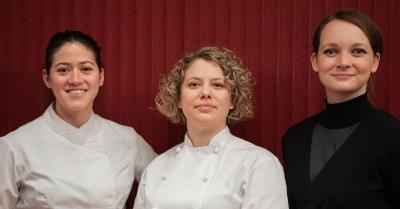20 Jan 2022

The problem of staff shortages in the industry isn't new, but it is decidedly more problematic post-pandemic.
At Conrad London St. James, Sally Abé and Emma Underwood are not only committed to giving their teams great working conditions, opportunities and benefits, but to empower women to fill high-ranking positions within the business.
Most of the senior management team at the hotel are women, and there’s very much a self-perpetuating culture of respect and loyalty. Within Sally Abé's kitchen team and Emma Underwood's front of house team at The Pem, women take up most of the senior roles, too.
"When you create a business model, the sustainability of staff is so often an afterthought," Emma explained.
"Now, it needs to be at the forefront. You need to start with 'how can I take care of my staff and how can my business model support them."
The image of the industry has suffered from the coverage it has received in the past eighteen months.
Faced with this, Emma said, "It's going to be a natural re-evaluation. Restaurants are going to have to work hard to give decent working hours and decent pay reflecting of their efforts."
"Here, we're working on a 39-hour contract. If they work more, they get paid," she said, and Sally added: "they get a proper wage and then they get an equal share of 100% of the service charge on top."
Working for Hilton, the list of benefits is huge, she explained. A job there will land you a retirement scheme, a dental plan, discounted hotel stays, provision and laundering of uniforms and shoes, access to training programmes like WSET, supplier trips, internal EAPs, "things that small employers wouldn't normally be able to offer."
"We've got all these amazing things to shout about, but it's just getting lost in all the other noise."
"Across the board," Emma said, "all restaurants are going to have to either pay more or look at their working conditions and their business models will have to adapt."
"If they don't adapt, they won't survive and it's as simple as that."
The eternal question of how to change people's attitude towards the industry is crucial here, Sally said, as "people think of it as, long hours, get shouted at, but no-one really talks about the good side of it."
"Certain chefs going on TV shouting and screaming at people for the last 20 years hasn't really helped with the image of the industry. What we need to do is promote the good bits: you can learn about food and wine, you get to work in a dynamic, fast-paced environment, which certain people and certainly we thrive on."
"No, it's not for everybody, but sitting in an office isn't for everybody, and the hours can be classed as anti-social but we still have a lovely social life. Everybody focuses on the negatives in the industry but there are so many positives."
"It's such a fulfilling, rewarding career, and you can take so many paths with it as well," not even necessarily staying on the restaurant floor.
"For me, it's about being part of a team and a family and treating your colleagues as if they are your family. I think that's quite unique in hospitality."